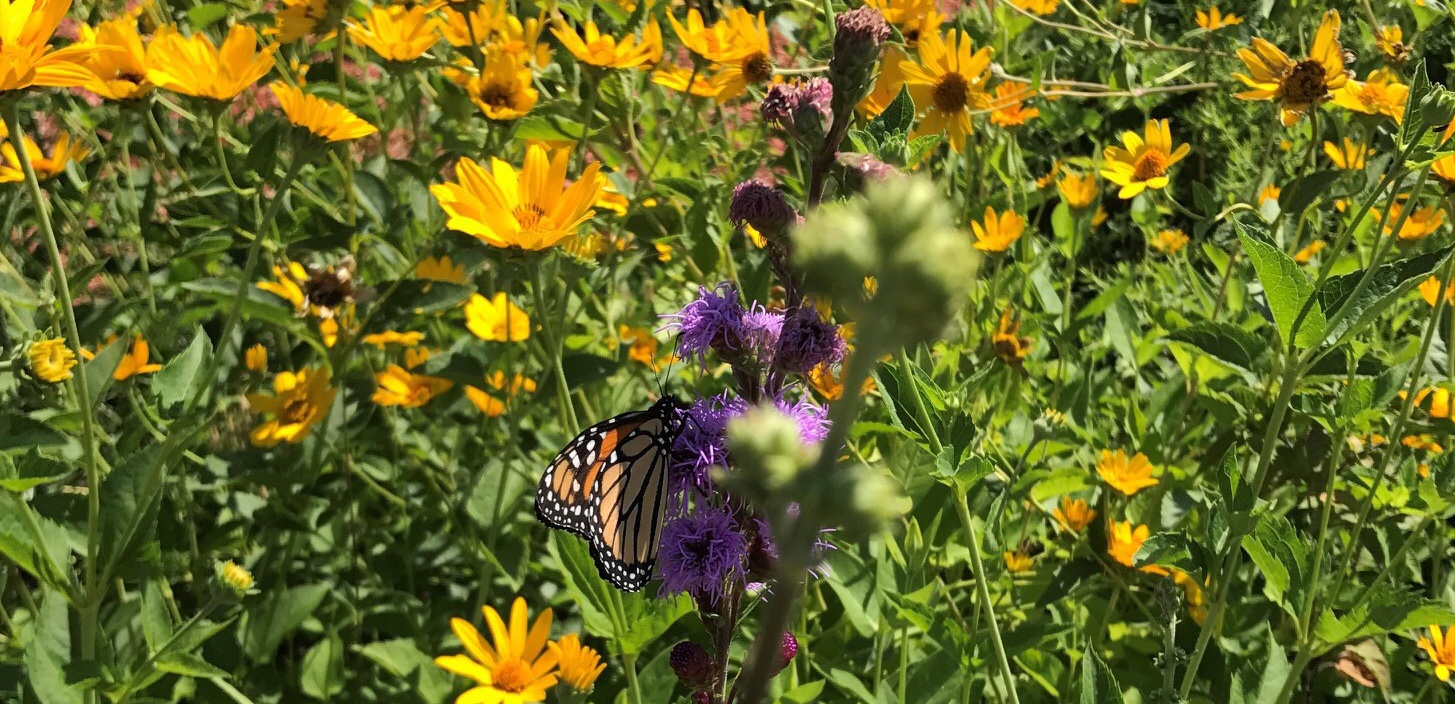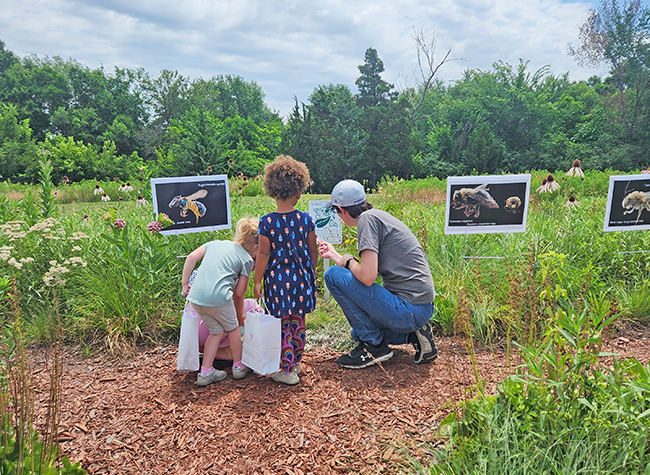Pollinator Prairie

In early 2017, the Johnson County Extension Master Naturalist (EMN) organization stepped into the role of maintaining and producing ongoing educational events at the glorious Pollinator Prairie Gardens located just a few blocks off Santa Fe and Ridgeview at 320 S Blake St. in Olathe, KS. To see details about the gardens, visit the Pollinator Prairie site hosted through Pollinator Partnership.
Here’s why it’s been a perfect partnership!
The Site’s Checkered History
During the 1950s-1980s, Chemical Commodities, Inc. (CCI) operated a chemical brokerage and recycling facility at this site. CCI bought chemicals from dozens of companies and government agencies. Over time, contamination from chemicals shipped to CCI for treatment were spilled or leaked into soils and groundwater, requiring a comprehensive remediation program and creation of a Superfund site.
One of the many companies that sold product to CCI was Rocketdyne, which was briefly part of The Boeing Company. On behalf of the responsible parties, Boeing has been working with the U.S. Environmental Protection Agency (EPA) and the local community since 1989 to clean up the site. The final cleanup remedy that met all the requirements set forth by the EPA was put into place, with installation efforts completed in 2011.
In May 2012, the remediated site was returned to the community for reuse. As a crucial part of the site remedy and reuse, Boeing has dedicated its resources and enlisted expertise from Monarch Watch, Pollinator Partnership, Wildlife Habitat Council and others to create an ecological habitat. The habitat consists of mostly native plants that provide pollinators like bees, birds, and butterflies, and especially Monarch butterflies, sources of food, shelter, and safe areas for breeding.
Environmental consulting firm, Haley & Aldrich, located in Overland Park, has functioned as Boeing’s on-site eyes and ears since the inception of the project, and still has day-to-day overview and responsibility for coordinating the ongoing remediation monitoring as well as working closely with the EMNs for site maintenance and educational programing.
The Perfect Partnership
The Pollinator Prairie Garden was the first official project of Johnson County’s EMN organization because it encompasses most of the goals of their mission statement!
The garden focuses on:
- Pollinator habitat,
- native wildflowers and grasses,
- management of invasive plants and shrubs,
- seed gathering,
- bird habitat,
- tree and shrub planting,
- educational programming, and
- building community between EMNs, Boeing, Haley & Aldrich, the Greater Kansas City nature-loving public, as well as the Olathe neighbors who live in the vicinity of the gardens.
Management of the Pollinator Prairie
 The gardens consist of four somewhat “formal” native garden sites for birds, bees, butterflies, and Monarchs as well as four native grass areas that show what a typical prairie might look like. There is a wide (wheelchair-accessible) sidewalk that leads to each of the four main gardens, with a covered gazebo and benches. Note: There are no restroom facilities onsite.
The gardens consist of four somewhat “formal” native garden sites for birds, bees, butterflies, and Monarchs as well as four native grass areas that show what a typical prairie might look like. There is a wide (wheelchair-accessible) sidewalk that leads to each of the four main gardens, with a covered gazebo and benches. Note: There are no restroom facilities onsite.
Each of the gardens includes a wide variety of plants and grasses that were selected by the University of Kansas’ Professor, Emeritus Dr. Chip Taylor, founder and director of Monarch Watch, the country’s most comprehensive monarch-research program.
The more formal areas are perfect for showing the public how native plants would look in their home gardens in a landscape design that is less wild and unkempt than they might be in nature. Part of the EMN mission is to teach visitors how to manage and maintain native gardens like this at their homes or offices. Reigning in some of the robust and opportunist native plants can be a bit of a challenge in some years!
The four less formal beds show the diversity of native grasses and provide educational opportunities to understand their role in providing pollinator and wildlife shelter as well as overwintering and breeding habitat. These areas were created as inspiration to people who may have a perfect spot in their yards where they can create their own “wild” prairie areas.
Along with inputs from Boeing and Haley & Aldrich, the EMNs coordinate two important public educational events each year:
Wonders of Discovery
On Friday of National Pollinator Week (usually the third week in June), we host members of the public as well as busloads of day-campers from Johnson County Parks and Recreation who come to learn about the importance of pollinators and ways we can support them
Hasta Luego Monarchs
During September we host another public event to celebrate and tag Monarch butterflies as they migrate through the KC area from their travels north of here down to their overwintering grounds in the Monarch Butterfly Reserves in Mexico.
Learn more
Follow the Pollinator Prairie on Facebook to see photos of the gardens throughout the seasons.
Contact:
Amy Keigher, Extension Natural Resources Agent
913-715-7000
